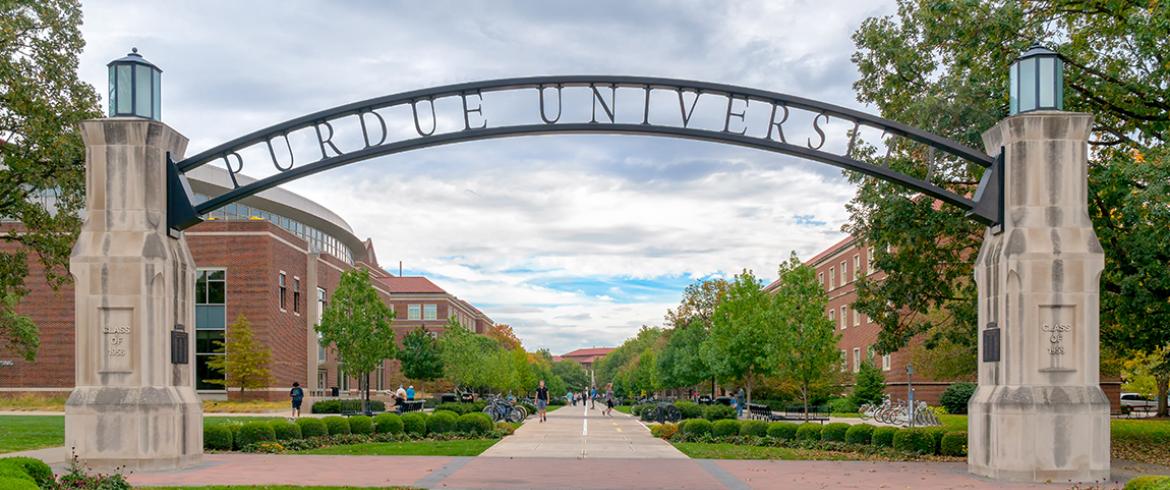
Entrance Gate and Walkway at Purdue University. (wolterke for Adobe Stock)
Felisa Higgins, a FAMU-FSU College of Engineering alumna, embraces a new role at Purdue University’s distinguished John Martinson Honors College.
After serving as Associate Dean and Donan Professor of Business Administration in the Smeal College at Pennsylvania State University, Higgins has transitioned back to her engineering roots, taking on a position that honors her past and shapes the future.

Higgins was selected as the Associate Vice Provost and Dean of the John Martinson Honors College, serving as a clinical professor in the Mitch Daniels School of Business and as a professor of practice in the College of Engineering. This dual appointment reflects a career that is as versatile as it is impactful.
Higgins’ academic journey began at Florida A&M University (FAMU) with a bachelor’s degree in industrial engineering (’95) from the FAMU-FSU College of Engineering. She earned a master’s degree in the same field from Florida State University (’97), and a doctorate from Purdue University (’03). Each step along her educational path was a building block towards a career marked by significant contributions to academia and industry.
Throughout her career, she has always held a special spot in her heart for the place where it all began—the FAMU-FSU College of Engineering, and shared some thoughts about her time with us.
What most excites you about your new journey at Purdue?
Returning to Purdue, where I completed my Ph.D. in industrial engineering, is incredibly exciting. Now leading the John Martinson Honors College, I’m eager to join a community known for its creativity and passion for solving pressing global issues. Ranked among the top 10 honors colleges, JMHC is poised for further growth. Purdue’s commitment to addressing global challenges aligns perfectly with my aspirations. Collaborating with all members of the Purdue community, I aim to build on our strengths for a brighter future.
How did the FAMU-FSU College of Engineering help you succeed on your engineering journey?
My time at the FAMU-FSU College of Engineering laid a strong technical and leadership foundation that has been instrumental in my career. As an industrial engineering graduate, I developed critical problem-solving skills, an analytical mindset and an understanding of complex systems—tools I have consistently applied throughout my journey in both academia and industry. The faculty at the joint college were deeply committed to student success, nurturing individuals from a wide range of backgrounds. My classmates came not only from Florida but from across the U.S. and around the world.
Tell us about your undergraduate experience at an HBCU.
The HBCU experience was invaluable. It gave me a perspective I could not have gained elsewhere. Being in an environment that fostered open discussions about the experiences, struggles and triumphs of Black people was especially meaningful to me as an Afro-descendant woman from Panama. I learned about Black philosophers, inventors, writers, leaders and heroes in ways I had never encountered before. This enriched my understanding of history and culture while also strengthening my sense of purpose.
What are your favorite memories from college?
One of my most memorable college experiences was at the engineering college, where mentors like Dr. Samuel Awoniyi and Dr. Ben Wang significantly influenced my growth. Their guidance was invaluable to me. I will always be grateful to them and many others in the College of Engineering faculty.
I loved spending time in the engineering building, delving into research projects, especially an early AI project, which was incredibly fulfilling. I cherished being in our ‘own little world’ in the engineering building (there was only one at that time) and working on research projects that taught me the value of teamwork and persistence. The sense of community and the multicultural friendships I formed there deeply impacted my personal and professional development, teaching me the importance of empathy and collaboration.
What hardships have you had to overcome?
One of the most significant challenges I faced was experiencing severe vision loss due to Keratoconus, a degenerative disease of the cornea. At the age of 30, I received corneal transplants to restore my sight. This experience was both physically and emotionally challenging, particularly because much of my work at the time involved extensive reading and using computers to develop and test optimization models. It was an especially trying period, as I needed to meet very ambitious research goals to complete my doctoral studies. Faith and staying focused on my long-term goals gave me the strength to persevere. The experience also developed in me a keen appreciation for universal design in teaching, learning and research to support various ability levels.
What is your best advice for students?
Stay open-minded, empathetic and resilient. Explore beyond the familiar. Embrace different perspectives, take risks and be persistent. Adaptability and persistence are crucial for long-term growth and success in any field.
Is there anything you would like to share with our students and community?
Embracing imperfection is important. My favorite book, “The Gifts of Imperfection” by Brené Brown emphasizes the power of vulnerability and authenticity in personal and professional settings. Understanding the difference between perfectionism and striving for excellence is crucial for growth and success.
RELATED ARTICLES
Alumnus Designs Innovative Modular Pathway to Enhance Pedestrian Accessibility
IME PhD Student Named Purdue ‘Black Trailblazer in Engineering’ Fellow
